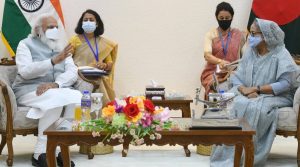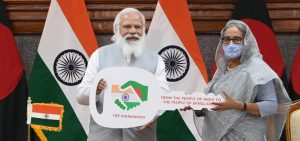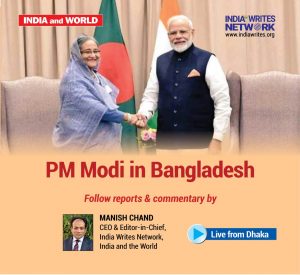
DHAKA: From commerce, connectivity and cultural alchemy to frontier areas such as start-ups, artificial intelligence and nuclear power, Prime Minister Narendra Modi’s historic visit to Bangladesh for “triple celebrations” has ushered in a new “sonali adhyay” (golden chapter) in multi-faceted strategic partnership between the two South Asian neighbours.

PM Modi’s second visit to Dhaka – he visited Bangladesh after a hiatus of six years – is steeped in an atmosphere of national rejoicing as India and Bangladesh jointly celebrate “Mujib Borsho” – the birth centenary of Sheikh Mujibur Rahman, 50 years of Bangladesh’s war of liberation and 50 years of the establishment of diplomatic ties. Mutual goodwill and warmth of sentiments flowed spontaneously as Dhaka pulled out all the stops to welcome the Indian leader. In a special gesture, Bangladesh Prime Minister Sheikh Hasina, accompanied by her senior ministers, personally received PM Modi at the Hazrat Shahjalal International Airport on March 25.
In diplomacy, florid words are often used by leaders as feel-good messaging, but sentiments expressed by PM Modi and Sheikh Hasina on the Bangladesh National Day came straight from the heart. Sporting a ‘Mujib Jacket’ as a tribute to Bangladesh’s beloved Father of the Nation “Bangabandhu,” PM Modi’s voice turned emotional as he described his presence in Dhaka on this historic occasion as “one of the most memorable days of my life” and recalled that how as a young man in early twenties, “doing satyagraha for independence of Bangladesh” was one of the finest moments of his life. Sheikh Hasina also struck an emotive tone, saying “In our independence war, we always remember the contribution of India.”
Shared Future
The two-day visit of PM Modi that ended on the evening of March 27 wasn’t just about goodwill gestures, bonhomie and spectacle, but about the shared future of the two countries, intertwined by deep-seated cultural and historical ties. On Day 1 of his visit, PM Modi set the tone by announcing an India-Bangladesh partnership in start-ups. Marking 50 years of establishment of diplomatic ties, PM Modi invited 50 entrepreneurs from Bangladesh to visit India to join the country’s start-up and innovation ecosystem and meet India’s venture capitalists. He also announced 1000 Swarna Jayanti scholarship for youths of Bangladesh, which is given to young scientists in fields of biology, chemistry, environmental science, engineering, mathematics, medicine and physics. These two pioneering initiatives will frame the future trajectory of the India-Bangladesh partnership which will revolve increasingly around youth, innovation, technology and entrepreneurship.
Taking the agenda of the December 2020 digital summit forward, the wide-ranging talks between PM Modi and Sheikh Hasina culminated in a future-looking template for next steps in the India-Bangladesh partnership. With a view to upscaling economic partnership, a trade framework pact was signed which will not only enhance trade and investment, but will also enable Dhaka to reduce trade deficit with New Delhi and make two-way business more balanced. With a political push from the two leaders, CEPA negotiations are expected to acquire momentum in days to come.
Connectivity
Connectivity will continue to power bilateral ties as a new passenger train called “Mitali Express” was virtually launched by the prime ministers of India and Bangladesh to link Dhaka cantonment to New Jalpaigiri. Ahead of his visit to Dhaka, PM Modi had put the spotlight on enhancing connectivity by inaugurating the ‘Maitri Setu’ (Friendship Bridge) and other infrastructural projects in Tripura, India’s northeastern state. It’s not just bilateral connectivity but the two countries will also be closely cooperating in promoting regional connectivity and integration through platforms such as BIMSTEC, IORA and SAARC.
The Way Ahead

Blending spectacle and substance, PM Modi’s Dhaka visit has raised the bar high and unveiled new visas in this mutually energizing partnership. PM Modi has evocatively called this new 2.0 phase of India-Bangladesh relations as Nai Urja, New Gati (New Energy, New Momentum) that is brimming with possibilities. Giving a peek into the future of India-Bangladesh relations, India’s Foreign Secretary Harsh Vardhan Shringla outlined these frontier areas, including start-ups, artificial intelligence, big data, internet of things and Industrial Revolution 4.0. Collaboration in public health and pandemic mitigation will be an important area of shared endeavour. The symbolic presentation of 109 life-support ambulances and another batch of 1.2 million units of Made-in-India vaccine underscored that Delhi and Dhaka will walk together, in sickness and in health. At 10.2 million, Bangladesh is the largest recipient of Indian vaccines.
Going forward, to retain the momentum in burgeoning ties, PM Modi and Sheikh Hasina also exchanged notes on shaping and elevating this partnership for the next fifty years. Taking the long view, the Delhi-Dhaka connect has the potential to become a model for the dysfunctional South Asian region scarred by suspicion and distrust. Going by this extremely productive and future-looking engagement between the leaders of India and Bangladesh at the historic celebrations, it’s possible to reimagine a new future of South Asia that is more physically, culturally and emotionally integrated. Moving beyond diplomacy, the overarching message from PM Modi’s Dhaka journey was be a joyous celebration of shared cultural heritage, historical connections and robust people-to-people ties that will intertwine dreams of over 1.5 billion people living in the two countries.

(Manish Chand is Editor-in-Chief of India Writes Network and India and the World magazine. The writer travelled to Dhaka for Prime Minister Modi’s first visit to a foreign country during the pandemic.)
Author Profile

- Manish Chand is Founder and Editor-in-Chief of India Writes Network (www.indiawrites.org) and India and World, a pioneering magazine focused on international affairs. He is CEO, Centre for Global India Insights, an India-based think tank focused on global affairs.
Latest entries
 India and the WorldFebruary 27, 2026Modi visit: India-Israel partnership enters a new era
India and the WorldFebruary 27, 2026Modi visit: India-Israel partnership enters a new era India and the WorldFebruary 24, 2026Unravelling Modi’s Israel journey: What to expect
India and the WorldFebruary 24, 2026Unravelling Modi’s Israel journey: What to expect India and the WorldFebruary 17, 2026South-by-South: Focus on people-centric solutions at India AI summit
India and the WorldFebruary 17, 2026South-by-South: Focus on people-centric solutions at India AI summit India and the WorldFebruary 7, 2026Modi hails interim India-US trade deal, Goyal says no concessions made on agriculture
India and the WorldFebruary 7, 2026Modi hails interim India-US trade deal, Goyal says no concessions made on agriculture







